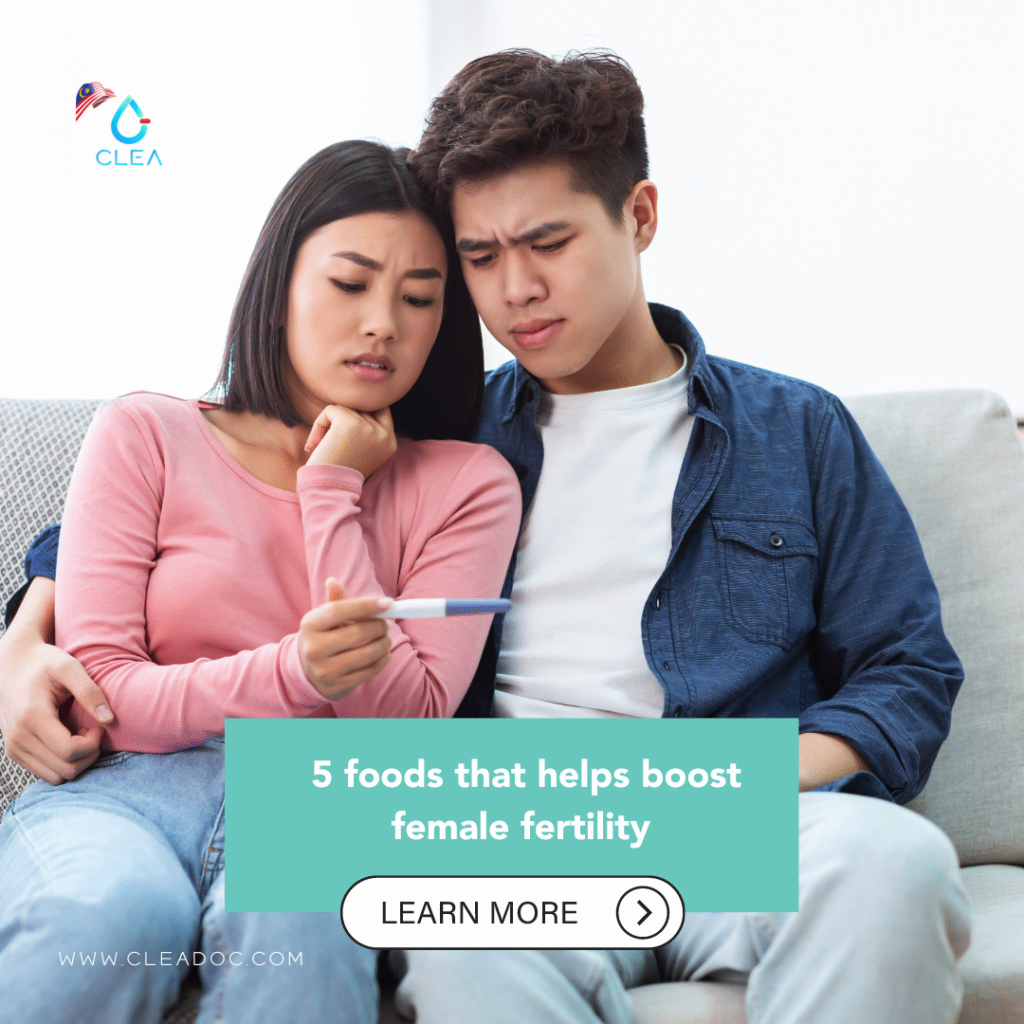Up to 15% of couples experience fertility problems. Although becoming a parent might be quite difficult at times, know that you are not alone in facing these difficulties. There are a few natural strategies to boost your fertility, which is fortunate. Unsaturated fats, whole grains, veggies, fruits, cheese, and seafood are connected with better female fertility.

1. Fruits and veggies

Although there are no special foods that can help you become pregnant, you can make a simple change to boost your fertility and reproductive health by filling up your plate with fruit and vegetables. Make fresh fruits and vegetables the majority of your plate at each meal. Along with other raw fruits and vegetables, watermelon and asparagus provide the body with nutrition.
“Watermelon and asparagus, in addition to other raw fruits and vegetables, give the body a rich supply of glutathione, which is important for egg quality,” says Alisa Vitti, integrative nutritionist and author of Perfect Your Cycle, Amplify Your Fertility, Supercharge Your Sex Drive, and Become a Power Source. “Kale is another powerhouse vegetable because it contains elements necessary for estrogen metabolism.”
2. Unsaturated fats

Moderation healthy, plant-based fats are an essential part of any balanced diet. Nuts, avocados, olive oil, and grape seed oil can reduce inflammation in the body, which promotes regular ovulation and general fertility. Evidence points to higher fertility rates in women who consume diets high in monounsaturated fat. (Source: bda.uk.com)
Surprisingly, some fats may even assist people who truly struggle with infertility. “Studies have shown that consuming a certain quantity of monounsaturated fats in the form of avocados during the IVF cycle increased the success rate by 3 1/2 times, as opposed to women who don’t eat good plant-based fats during IVF period,” Vitti says. (Source: parents.com)
3. Whole grains

Cereals are food that are found on the first level of the Malaysian Food Pyramid. Whole grains are high in dietary fiber, antioxidant nutrients, vitamins, minerals, lignans, and phenolic compounds. Whole grain intake shows it helps decrease insulin resistance. Insulin resistance has been implicated in the development of polycystic ovarian syndrome and recurrent pregnancy loss. (Source: ncbi.gov)
4. Greek yogurt and cheese

Foods high in fat are excellent for improving fertility. Calcium, probiotics, and vitamin D are all nutrients found in Greek yogurt and cheese that help to promote ovulation. Goat cheese, swiss cheese, and whole milk are additional dairy products that promotes fertility. Contrary to popular belief, full-fat dairy products improve the likelihood of conception whereas low-fat dairy products seem to raise the risk of infertility. (Source: betternutrition.com)
5. Seafood

High intake of Omega-3 fatty acids from fish or dietary supplements improves embryo shape, lower anovulation risk, and increased progesterone levels. Both the menstrual cycle and the development of high-quality eggs can be affected by zinc deficiency, neither of which is helpful for fertility. Other fertility-friendly foods, including as beef, poultry, dairy, nuts, eggs, whole grains, and legumes, include smaller quantities of zinc.
Practising a healthy diet helps improve female fertility.
This is an excellent idea for both men and women, especially because the average couple tries to get pregnant naturally. Extra folic acid, vitamin B12, and omega-3 fatty acids may be beneficial for women. Contrary to the harmful effects of body weight, nutrition plays a significant role in improving reproduction. However, ovulatory problems and metabolic diseases like diabetes, as well as the interaction between diet and fertility, appears crucial for reproductive success.
Want to know more regarding fertility? Speak to your friendly doctor from CLEADOC via Virtual Doctor.

Useful links :
https://cleadoc.com
Reference:
https://www.bda.uk.com/resource/a-clinical-update-on-diet-and-fertility.html
https://www.ncbi.nlm.nih.gov/pmc/articles/PMC4894002/
https://www.betternutrition.com/diet-and-nutrition/7-foods-for-fertility/
https://www.ncbi.nlm.nih.gov/pmc/articles/PMC7469023/
https://www.everydayhealth.com/pregnancy/getting-pregnant/foods-that-make-you-fertile.aspx
https://www.ncbi.nlm.nih.gov/pmc/articles/PMC6079277/#:~:text=Diets%20high%20in%20unsaturated%20fats,outcomes%20in%20women%20and%20men.


